Advertisement
Bakuchiol: Skin Care Benefits & Is It Really A Retinol Alternative?

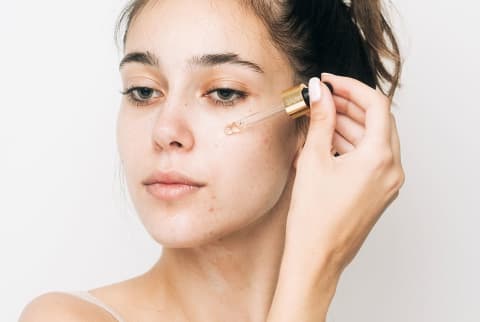
Retinol is undeniably one of the most talked-about skin care ingredients out there. It's a powerful active that can assist in a host of skin concerns from wrinkles to acne and more. Nevertheless, plenty of people can't tolerate it whatsoever.
It's no wonder retinol alternatives are popping up more and more, but is there any truth to these alleged "dupes"? To follow, we investigate one of the most popular: bakuchiol.
What is bakuchiol?
"Bakuchiol is a 100% natural active ingredient obtained from the babchi seeds (Psoralea corylifolia plant)," clean cosmetic chemist and founder of KKT Consulting Krupa Koestline tells mbg. The plant's blooms are purple, which is why many of the bakuchiol products today have a slight lavender hue.
She adds, "The plant where bakuchiol comes from, the Psoralea corylifolia, is endemic to certain Asian countries such as India and Himalayan regions of Pakistan and China." This wild species has been used in Ayurvedic medicine for centuries, Koestline notes, so it's certainly not new—however, it has gained popularity in the commercial skin care market as of late.
Meet the cosmetic chemist:
Benefits of bakuchiol
Unlike retinol, bakuchiol hasn't been extensively researched for topical skin benefits. However, dermatologists and Koestline note a host of promising potential benefits from early research. To follow, a bit more about what you can expect when you add this botanical to your routine:
- Increases cell turnover
- Improves sun-damaged skin
- Evens skin tone
- Stimulates collagen production
- Reduces fine lines & wrinkles
- May help treat acne
For a more in-depth explanation, read on:
Increases cell turnover
"Similar to retinol, bakuchiol stimulates cell turnover," Koestline says. Translation: You shed dead and damaged skin cells at a quicker rate, nipping a dull complexion in the bud. This isn't quite the same mechanism as exfoliation but can be seen as a way to revive lackluster complexions.
Improves sun-damaged skin
Now, this is where bakuchiol really shines. Remember when we said it's been called a "retinol alternative"? Well, that's because a 2019 randomized, double-blind study put bakuchiol up against retinol to measure its effectiveness.
The results: "U.C.-Davis dermatologists concluded that bakuchiol is comparable to retinol in its ability to improve photoaging1 and is better tolerated than retinol," Koestline notes. Read: less peeling, dryness, and scaling.
Evens skin tone
Libby notes that bakuchiol can also help encourage even skin tone and texture. For those with hyperpigmentation from sun damage, previous breakouts, or hormonal patches like malasma, this is a benefit worth noting.
Stimulate collagen production
In this 2014 study, bakuchiol was shown to stimulate collagen production (another retinol-like benefit). More specifically, this botanical enhances types I, III, and IV collagen. This is most significant with type III collagen, as that decreases with age and greatly contributes to overall skin elasticity.
Reduce fine lines & wrinkles
Bakuchiol also has the power to minimize the appearance of fine lines and wrinkles2, says double board-certified dermatologist Tiffany Libby, M.D., FAAD. This happens because of the increased cell turnover and collagen stimulation, researchers suspect.
May help treat acne
What's more, "Bakuchiol also has antibacterial properties and helps fight acne," Libby notes. Of course this helps manage all forms of breakouts, but bakuchiol won't necessarily clear acne brought on by genetics, hormone imbalance, diet, and the like. Still, it's a great addition to an acne-healing routine regardless.
It's also important to note that stronger forms of retinol like retinaldehyde and prescription-grade retinoids are often used to treat acne. While bakuchiol may help ease breakouts, it hasn't yet been directly compared to stronger retinoids for treating acne.
Cautions
The best part about bakuchiol: It's a relatively low-risk ingredient to test out. "It has not been known to cause skin irritation or increase sensitivity and can be paired with many skin care ingredients," Libby says.
However, with all botanical ingredients, you should patch-test your bakuchiol product and wait 24 hours before going in for a full application.
Is it a retinol alternative?
"Since bakuchiol offers many benefits similar to that of using a retinol, it has been referred to as a 'retinol alternative,'" Libby notes. This is largely due to the study above that directly compared retinol to bakuchiol, favoring the latter for similar benefits without the negative side effects1.
"However, its chemical structure is different from that of a retinol or retinoid, so they are technically different molecular compounds and should be considered separately," she adds.
So while anyone with sensitivity to retinol should certainly test out bakuchiol instead, it's not going to impact the skin in the exact same way. Like all ingredients, some skin types may prefer retinol and others bakuchiol.
What's more, you can certainly use the two in the same routine. Below, how to add this purple botanical to your regimen.
How to use it
Retinol comes with a strict set of usage guidelines: Only use it at night, skip a day in between if you're sensitive, don't mix with chemical exfoliants, and so on. Luckily, bakuchiol is much more flexible. Here are a few usage tips:
- Use morning or night: "Bakuchiol serums can be used in the morning or at night, or both," Libby notes. This is because bakuchiol is not photosensitive like some retinol, so it won't destabilize in the sunlight.
- Use once or twice a day: Libby notes this ingredient can be used twice a day if desired, as it's not going to sensitize your skin like retinol can.
- Use with other actives: "Bakuchiol can be used with a retinol or a chemical exfoliant," Libby notes. What's more, mixing it with retinol may even be beneficial: "It also may be synergistic with retinol use, as it helps stabilize retinol, which is known to break down in the presence of light," she adds (however, not all retinoids are photosensitive.)
Long story short: Use bakuchiol as you see fit in your skin care routine. As with any ingredient, be sure to patch-test it first for any allergic reactions. Add it to your morning or evening routine, and use it once or twice a day—the choice is yours.
Sustainability concerns
With natural ingredients comes the question: Where are we getting this extract? And more, is it OK that we're harvesting this part of nature for use in beauty products? Here's what Koestline says:
"Up until 2017, there was no commercially produced babchi plant (where bakuchiol comes from). Because babchi is already an endangered species and a low germinating plant, there were concerns about its possible extinction."
However, an increase in recent demand leads Koestline to believe that this ingredient can be sustainably produced at this moment. The bottom line: It may not be fully clear right now how sustainable using bakuchiol in skin care is, but the hopes are high for commercially produced bakuchiol now and in the future.
Bakuchiol for sensitive skin
Those with sensitive skin need to be extra careful with what they use. This can make looking for healthy aging ingredients rather frustrating, as many popular options tend to be too irritating.
Bakuchiol, as we’ve noted throughout this story, is an excellent option for those with sensitive skin. It does not come with the same irritation, adjustment time, or cautions as its retinol counterpart.
Bakuchiol products
Herbivore
Bakuchiol Retinol Alternative Smoothing Serum
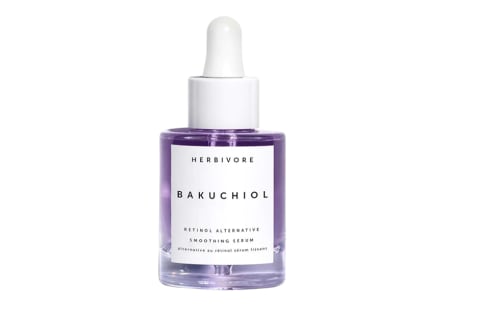
Supergoop
Daily Dose Bioretinol + Mineral SPF 40 with Bakuchiol
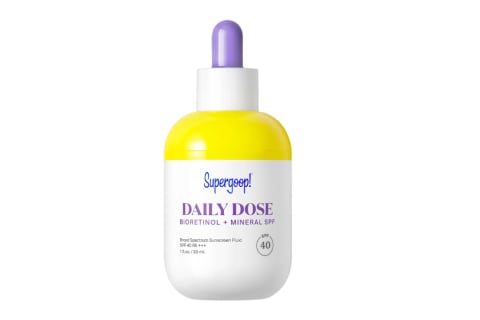
Alpyn Beauty
PlantGenius Melt Moisturizer
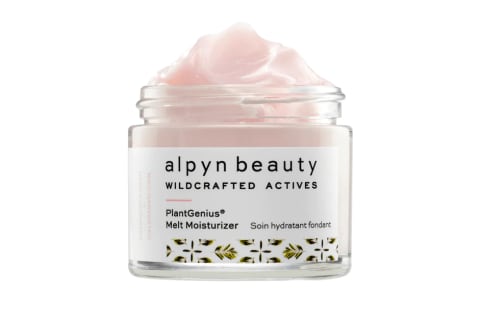
Spoiled Child
G25 Anti-Aging Retin + Night Rewind Serum
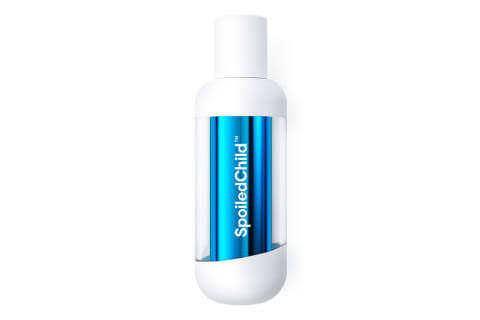
FAQ
Is bakuchiol as good as retinol?
A 2019 randomized, double-blind study put bakuchiol up against retinol to measure its effectiveness. The results: "U.C.-Davis dermatologists concluded that bakuchiol is comparable to retinol in its ability to improve photoaging and is better tolerated than retinol," Koestline notes.
What are the side effects of bakuchiol?
The best part about bakuchiol: It’s a relatively low-risk ingredient to test out. “It has not been known to cause skin irritation or increase sensitivity and can be paired with many skin care ingredients," Libby says. However, with all botanical ingredients, you should patch-test your bakuchiol product and wait 24 hours before going in for a full application.
What should I not mix with bakuchiol?
"Bakuchiol can be used with a retinol or a chemical exfoliant," Libby notes. What's more, mixing it with retinol may even be beneficial: "It also may be synergistic with retinol use, as it helps stabilize retinol, which is known to break down in the presence of light," she adds.
Is bakuchiol oil good for under eyes?
Yes, bakuchiol is a great ingredient to tend to the under eye area. In fact, it may be even better for the delicate under eye area than retinol, since the natural alternative tends to be less irritating. Using retinol under the eyes can help address fine lines, discoloration, crepiness, and sagging. Since the eye area is especially sensitive, we always recommend finding formulas specifically formulated safe for the eyes.
The takeaway
If you're sensitive to retinol (check our faves if you aren't), meet the powerful alternative, bakuchiol. This purple botanical extract has been compared to retinol in clinical studies, demonstrating similar benefits without the irritation. Feel free to use it in the morning or evening and mix it with other actives. Want to learn more about retinol and why it works? Check out this guide.